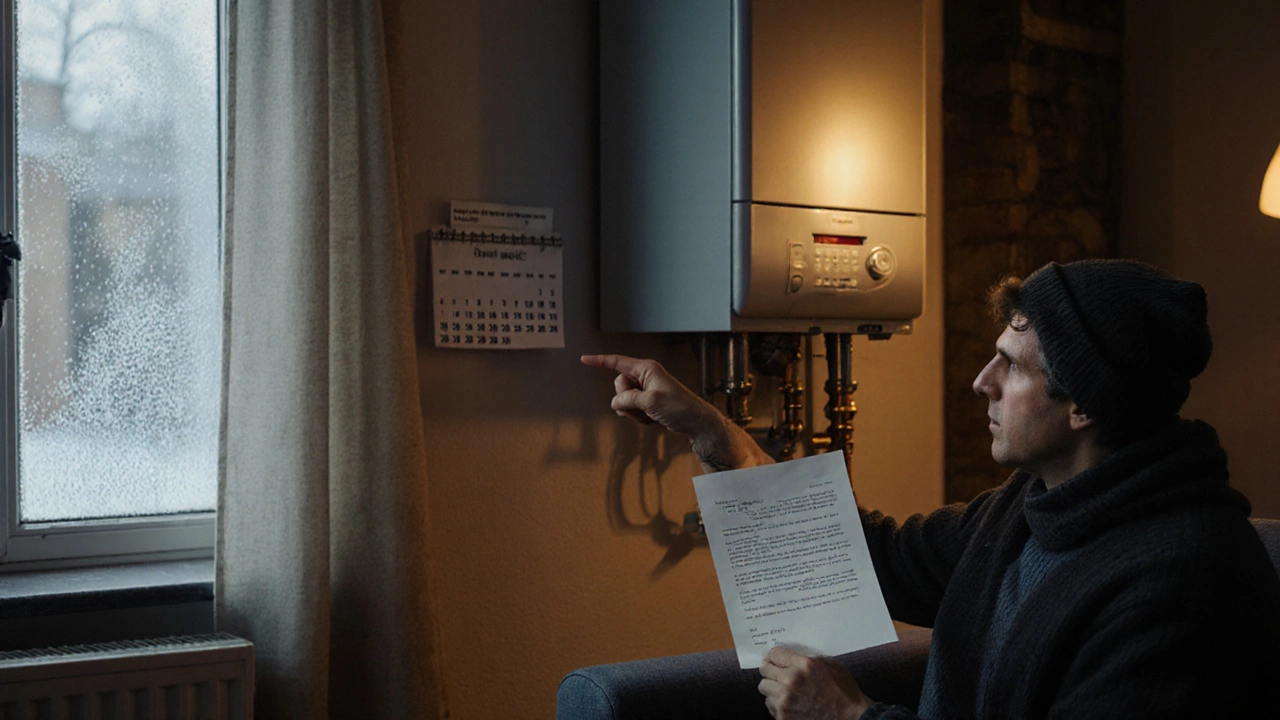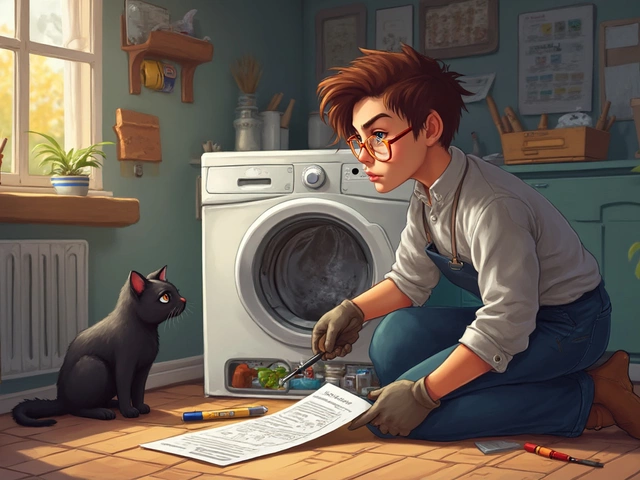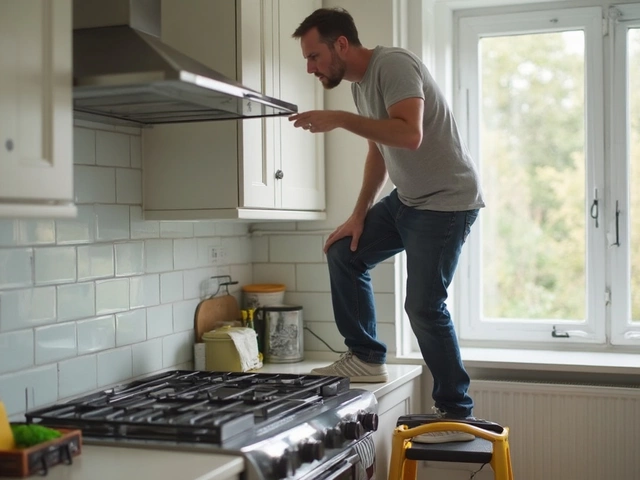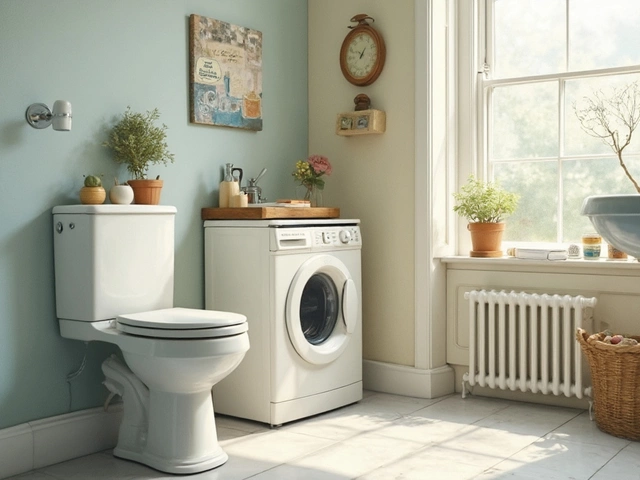When your boiler breaks down in the middle of winter, the last thing you want to worry about is who foots the bill. Is it your landlord? Your home insurance? Or are you on your own? The answer isn’t always clear - and that’s where most people get stuck.
Landlords and Tenants: Who’s Responsible?
In Australia, if you’re renting, the law is straightforward: the landlord is legally responsible for keeping the boiler in safe, working order. That includes annual servicing, repairs due to normal wear and tear, and replacing parts that fail over time. This isn’t a suggestion - it’s under the Residential Tenancies Act in every state, including South Australia.
But here’s what tenants often misunderstand: the landlord doesn’t have to pay for damage caused by you. If you ignored warning signs - like strange noises, leaking, or dropping pressure - and didn’t report it, you could be held responsible. Same goes if you tried to fix it yourself, used the wrong settings, or blocked the air vents. A boiler isn’t like a toaster. Mess with it, and the cost can shift to you.
Landlords, on the other hand, can’t just wait until the boiler dies. They’re required to get it serviced once a year by a Gas Safe registered engineer. If they don’t, and something goes wrong, they could face fines or legal action - especially if someone gets hurt because the boiler was unsafe.
Homeowners: Your Boiler, Your Bills
If you own your home, you pay for everything. No exceptions. That means annual servicing, parts, labour, emergency call-outs, and even the cost of upgrading to a more efficient model when the old one gives out. There’s no one else to blame.
Many homeowners think, “My boiler is 10 years old - it’s still working, so I’ll skip the service.” Bad idea. A poorly maintained boiler can lose up to 20% efficiency. That’s extra $300-$500 a year on your gas bill. Plus, most manufacturers void the warranty if you don’t get annual servicing. If your boiler breaks down after year 7 and you never had it checked, you’re out of luck.
Some people try to save money by using unqualified handymen. Don’t. Gas work in Australia must be done by a licensed professional. If something goes wrong - a gas leak, carbon monoxide buildup - your home insurance might not pay out. And if you’re found to have used an unlicensed person, you could be liable for any harm caused.
Home Insurance and Boiler Cover
Standard home insurance doesn’t cover boiler breakdowns. It covers fire, theft, or water damage - not mechanical failure. But many people buy boiler cover separately, thinking it’s the same thing.
Boiler cover (also called heating cover) is a subscription service. You pay $30-$60 a month, and in return, you get annual servicing, emergency repairs, and sometimes parts replacement. It sounds great - until you read the fine print. Most policies have exclusions: if your boiler is over 15 years old, they won’t cover it. If it’s already broken when you sign up, they won’t fix it. And some only cover labour, not parts.
Compare two real cases from Adelaide last year:
- A homeowner paid $55/month for boiler cover. When their boiler failed, the company covered the repair - but only because they’d had the service done every year. The claim went through in two days.
- Another homeowner skipped cover, saved $660 a year, and then had a £1,200 repair bill when the heat exchanger cracked. No insurance, no cover - they paid out of pocket.
Boiler cover can be worth it if you’re on a fixed income, live alone, or don’t want to deal with finding a reliable technician. But don’t assume it’s a magic fix. Read the terms. Ask what’s included. Check the age limit. And never sign up if your boiler is already broken.
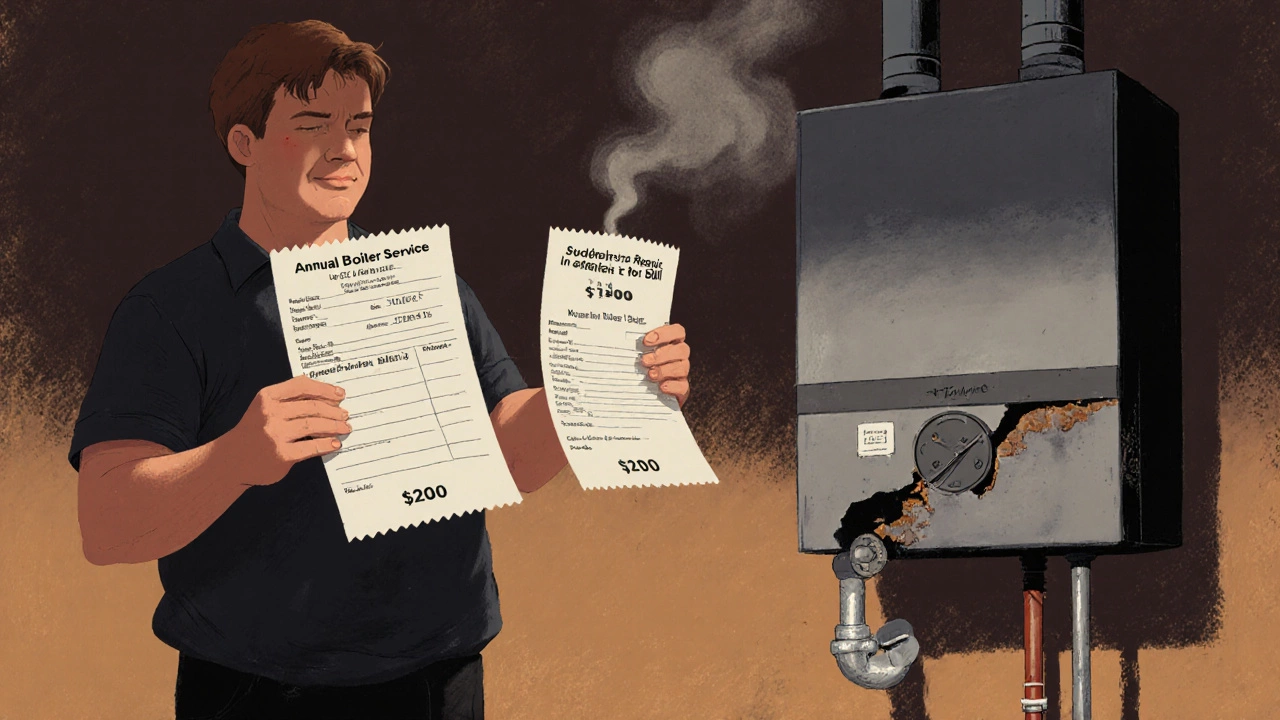
What About Council or Government Help?
In Australia, there’s no federal program that pays for boiler maintenance. But some states offer assistance for low-income households, pensioners, or people with disabilities.
In South Australia, the Energy Assistance Program gives eligible residents up to $250 a year toward heating costs. That doesn’t cover servicing, but it can help with bills if your boiler is inefficient. You can also apply for the Home Energy Efficiency Program, which sometimes funds boiler replacements for qualifying seniors.
These aren’t free fixes. You need to prove income, residency, and sometimes medical need. Apply through Services Australia or your local council. Don’t wait until winter - applications take weeks to process.
Signs You’re Being Asked to Pay the Wrong Bill
Landlords sometimes try to shift responsibility. They might say, “It’s your responsibility to keep the boiler running,” or “You used it too much.” That’s not true.
Here’s what you should never pay for as a tenant:
- Annual servicing (it’s the landlord’s legal duty)
- Repairs due to age or normal wear (e.g., corroded pipes, failing pump)
- Replacing the boiler if it’s over 10-15 years old
Here’s what you might be responsible for:
- Damage caused by your actions (e.g., freezing pipes because you turned off the heat)
- Replacing lost or broken thermostats you took
- Costs if you ignored warnings and caused a bigger problem
If your landlord asks you to pay for a service they’re legally required to provide, write them a letter. Keep a copy. If they refuse, contact the South Australian Civil and Administrative Tribunal (SACAT). They can order the landlord to pay up.
How to Avoid Costly Mistakes
Here’s what works in real life:
- Get your boiler serviced every year - even if it seems fine. It’s cheaper than a breakdown.
- Keep receipts. If you’re a tenant, ask your landlord for proof of service. If you’re a homeowner, keep your service records for warranty claims.
- Know your boiler’s age. If it’s over 15 years old, start budgeting for replacement. New boilers cost $3,000-$6,000 installed, but they’re 30% more efficient.
- Never ignore warning signs: strange smells, yellow flames, condensation on windows, or the boiler turning off randomly.
- Use only licensed gas fitters. Check their licence at Gas Safe Register (Australia’s official database).
One Adelaide family saved $1,800 in one year by catching a small leak early. Their technician found it during a routine check. If they’d waited, they’d have needed a full system replacement.
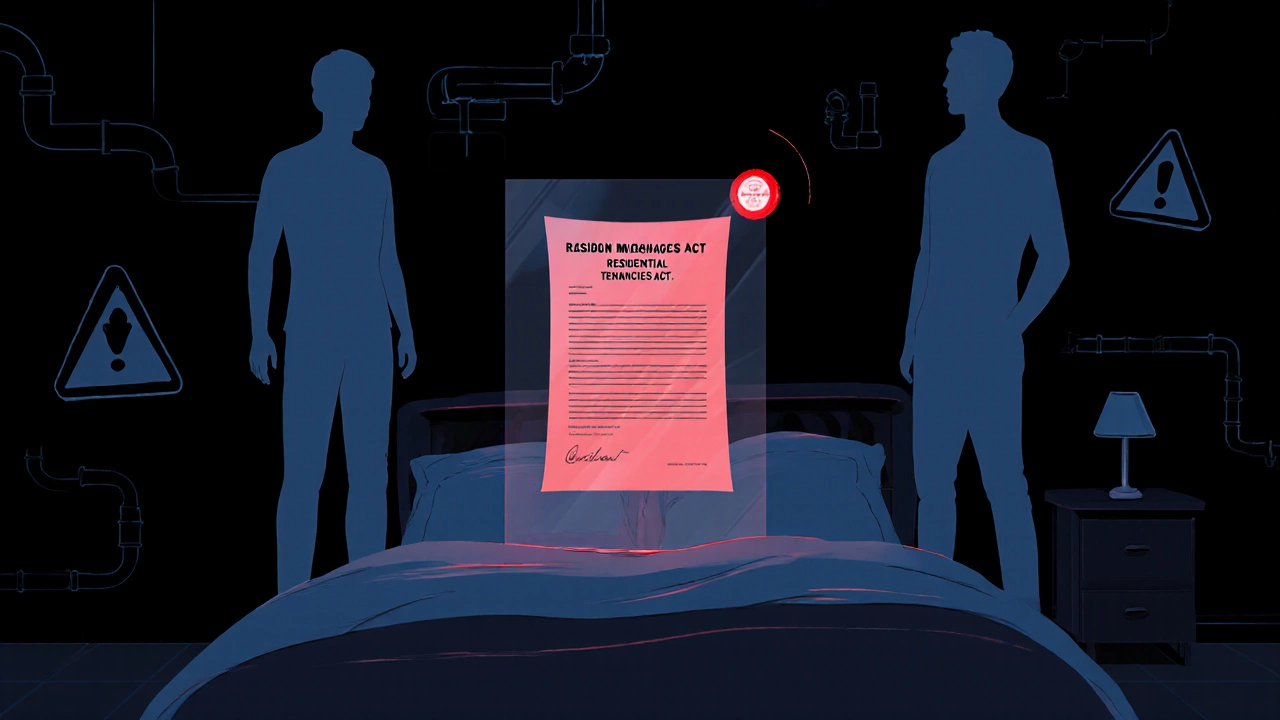
What Happens If You Don’t Maintain Your Boiler?
Ignoring boiler maintenance doesn’t just cost money - it risks lives.
A poorly maintained boiler can leak carbon monoxide - a silent, odorless gas that kills 4-6 people in Australia every year. Most of those deaths happen in homes where the boiler hadn’t been serviced in over two years.
Insurance companies know this. If you file a claim after a carbon monoxide incident and they find your boiler wasn’t serviced in the last 12 months, they can deny your claim - even if you were the victim.
And if you’re a landlord? You could be sued for negligence. There have been cases in Melbourne and Brisbane where landlords paid out over $200,000 in damages because they ignored boiler safety.
It’s not about being careful. It’s about being responsible.
Bottom Line: Know Your Role
Who pays for boiler maintenance? It depends on your situation:
- Tenants: You pay for misuse or neglect. Your landlord pays for everything else.
- Homeowners: You pay for everything - but you also control when and how it’s done.
- Everyone: Skipping service is a gamble. The cost of one emergency repair can equal five years of annual servicing.
Don’t wait for the boiler to fail. Don’t assume someone else will fix it. Take control - even if it’s just scheduling that one annual check. It’s the cheapest, safest thing you can do for your home.
Do I have to pay for boiler servicing if I’m renting?
No. Under Australian tenancy laws, your landlord is legally required to arrange and pay for annual boiler servicing. You’re only responsible if damage was caused by your actions, like blocking vents or ignoring warning signs.
Can my landlord charge me for boiler repairs?
Only if the damage was caused by you - like freezing pipes by turning off the heat, or tampering with controls. Normal wear and tear, aging parts, or manufacturing faults are always the landlord’s responsibility.
Is boiler cover worth it for homeowners?
It can be, if your boiler is older than 10 years or you’re on a tight budget. But check the terms: many plans exclude boilers over 15 years old, won’t cover pre-existing faults, or only pay for labour. Compare the cost of annual servicing ($150-$250) with the monthly fee - you might be better off saving the money yourself.
What happens if I ignore boiler maintenance?
Your boiler will become less efficient, costing more to run. It’s also more likely to break down unexpectedly - and dangerously. Carbon monoxide leaks are a real risk. Insurance may refuse claims, and landlords can face legal penalties if tenants are harmed.
Can I get government help to pay for boiler repairs?
Australia doesn’t offer direct boiler repair grants, but some states have energy assistance programs for low-income households, pensioners, or people with disabilities. In South Australia, the Energy Assistance Program gives up to $250/year toward heating costs. Apply through Services Australia or your local council.
Next Steps: What to Do Now
If you’re a tenant: Check your lease. Then ask your landlord for proof of the last boiler service. If they can’t show it, send a written request for one within 30 days. Keep a copy.
If you’re a homeowner: Look up your boiler’s age. If it’s over 10 years old, schedule a service before winter. Even if it’s working, a 15-minute check could save you $1,000 later.
If you’re unsure who’s responsible: Call your local tenancy tribunal or visit the Consumer and Business Services website for South Australia. They’ll give you free advice - no lawyer needed.

